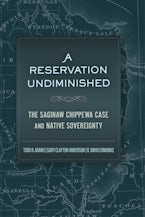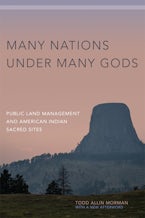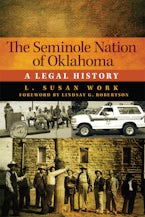LAW
Showing results 1-10 of 63
Filter Results OPEN +

A Reservation Undiminished
The Saginaw Chippewa Case and Native Sovereignty
Reservation Undiminished presents a cohesive narrative of a legal case that testifies to Native persistence in asserting territorial sovereignty in the twenty-first century—and that highlights the potential for conflict resolution in seemingly intractable legal struggles between state, local, and tribal governments.
Reservation Politics
Historical Trauma, Economic Development, and Intratribal Conflict
By engaging a topic often avoided in political science and American Indian studies, Reservation Politics allows us to see complex historical processes at work in contemporary American Indian life. Orr’s findings are essential to understanding why tribal governments make the choices they do.
Cherokee Civil Warrior
Chief John Ross and the Struggle for Tribal Sovereignty
Centering a Native point of view, this book recasts and expands what we know about John Ross, the Cherokee Nation, its commitment to maintaining its sovereignty, and the Civil War era in Indian Territory. Weeks also provides historical context for later developments, from the events of Little Bighorn and Wounded Knee to the struggle over tribal citizenship between the Cherokees and the descendants of their former slaves.
Many Nations under Many Gods
Public Land Management and American Indian Sacred Sites
A much-needed intervention, Many Nations under Many Gods brings to light the invisible histories of several Indian nations, as well as their struggles to protect the integrity of sacred and cultural sites located on federal public lands.
Loren Miller
Civil Rights Attorney and Journalist
Loren Miller: Civil Rights Attorney and Journalist recovers this remarkable figure from the shadows of history and for the first time fully reveals his life for what it was: an extraordinary American story and a critical chapter in the annals of racial justice.
The Seminole Nation of Oklahoma
A Legal History
When it adopted a new constitution in 1969, the Seminole Nation was the first of the Five Tribes in Oklahoma to formally reorganize its government. In the face of an American legal system that sought either to destroy its nationhood or to impede its self-government, the Seminole Nation tenaciously retained its internal autonomy, cultural vitality, and economic subsistence. Here, L. Susan Work draws on her experience as a tribal attorney to present the first legal history of the twentieth-century Seminole Nation.
Greece, Rome, and the Bill of Rights
Susan Ford Wiltshire traces the evolution of the doctrine of individual rights from antiquity through the eighteenth century. The common thread through that long story is the theory of natural law.
A Promise Kept
The Muscogee (Creek) Nation and McGirt v. Oklahoma
A Promise Kept explores the circumstances and implications of McGirt v. Oklahoma, likely the most significant Indian law case in well over 100 years. Combining legal analysis and historical context, this book gives an in-depth, accessible account of how the case unfolded and what it might mean for Oklahomans, the Muscogee (Creek) Nation, and other tribes throughout the United States.
Buying America from the Indians
Johnson v. McIntosh and the History of Native Land Rights
Johnson v. McIntosh and its impact offers a comprehensive historical and legal overview of Native land rights since the European discovery of the New World. Watson sets the case in rich historical context. After tracing Anglo-American views of Native land rights to their European roots, Watson explains how speculative ventures in Native lands affected not only Indian peoples themselves but the causes and outcomes of the French and Indian War, the American Revolution, and ratification of the Articles of Confederation. He then focuses on the transactions at issue in Johnson between the Illinois and Piankeshaw Indians, who sold their homelands, and the future shareholders of the United Illinois and Wabash Land Companies.
Seeking Justice for the Holocaust
Herbert C. Pell, Franklin D. Roosevelt, and the Limits of International Law
With its broad new examination of the background and context of the Nuremberg trials, and its expanded view of the roles played by Roosevelt and his unlikely deputy Pell, Seeking Justice for the Holocaust offers a deeper and more nuanced understanding of how the Allies came to hold Nazis accountable for their crimes against humanity.

A Reservation Undiminished
The Saginaw Chippewa Case and Native Sovereignty
Reservation Undiminished presents a cohesive narrative of a legal case that testifies to Native persistence in asserting territorial sovereignty in the twenty-first century—and that highlights the potential for conflict resolution in seemingly intractable legal struggles between state, local, and tribal governments.
Reservation Politics
Historical Trauma, Economic Development, and Intratribal Conflict
By engaging a topic often avoided in political science and American Indian studies, Reservation Politics allows us to see complex historical processes at work in contemporary American Indian life. Orr’s findings are essential to understanding why tribal governments make the choices they do.
Cherokee Civil Warrior
Chief John Ross and the Struggle for Tribal Sovereignty
Centering a Native point of view, this book recasts and expands what we know about John Ross, the Cherokee Nation, its commitment to maintaining its sovereignty, and the Civil War era in Indian Territory. Weeks also provides historical context for later developments, from the events of Little Bighorn and Wounded Knee to the struggle over tribal citizenship between the Cherokees and the descendants of their former slaves.
Many Nations under Many Gods
Public Land Management and American Indian Sacred Sites
A much-needed intervention, Many Nations under Many Gods brings to light the invisible histories of several Indian nations, as well as their struggles to protect the integrity of sacred and cultural sites located on federal public lands.
Loren Miller
Civil Rights Attorney and Journalist
Loren Miller: Civil Rights Attorney and Journalist recovers this remarkable figure from the shadows of history and for the first time fully reveals his life for what it was: an extraordinary American story and a critical chapter in the annals of racial justice.
The Seminole Nation of Oklahoma
A Legal History
When it adopted a new constitution in 1969, the Seminole Nation was the first of the Five Tribes in Oklahoma to formally reorganize its government. In the face of an American legal system that sought either to destroy its nationhood or to impede its self-government, the Seminole Nation tenaciously retained its internal autonomy, cultural vitality, and economic subsistence. Here, L. Susan Work draws on her experience as a tribal attorney to present the first legal history of the twentieth-century Seminole Nation.
Greece, Rome, and the Bill of Rights
Susan Ford Wiltshire traces the evolution of the doctrine of individual rights from antiquity through the eighteenth century. The common thread through that long story is the theory of natural law.
A Promise Kept
The Muscogee (Creek) Nation and McGirt v. Oklahoma
A Promise Kept explores the circumstances and implications of McGirt v. Oklahoma, likely the most significant Indian law case in well over 100 years. Combining legal analysis and historical context, this book gives an in-depth, accessible account of how the case unfolded and what it might mean for Oklahomans, the Muscogee (Creek) Nation, and other tribes throughout the United States.
Buying America from the Indians
Johnson v. McIntosh and the History of Native Land Rights
Johnson v. McIntosh and its impact offers a comprehensive historical and legal overview of Native land rights since the European discovery of the New World. Watson sets the case in rich historical context. After tracing Anglo-American views of Native land rights to their European roots, Watson explains how speculative ventures in Native lands affected not only Indian peoples themselves but the causes and outcomes of the French and Indian War, the American Revolution, and ratification of the Articles of Confederation. He then focuses on the transactions at issue in Johnson between the Illinois and Piankeshaw Indians, who sold their homelands, and the future shareholders of the United Illinois and Wabash Land Companies.
Seeking Justice for the Holocaust
Herbert C. Pell, Franklin D. Roosevelt, and the Limits of International Law
With its broad new examination of the background and context of the Nuremberg trials, and its expanded view of the roles played by Roosevelt and his unlikely deputy Pell, Seeking Justice for the Holocaust offers a deeper and more nuanced understanding of how the Allies came to hold Nazis accountable for their crimes against humanity.











